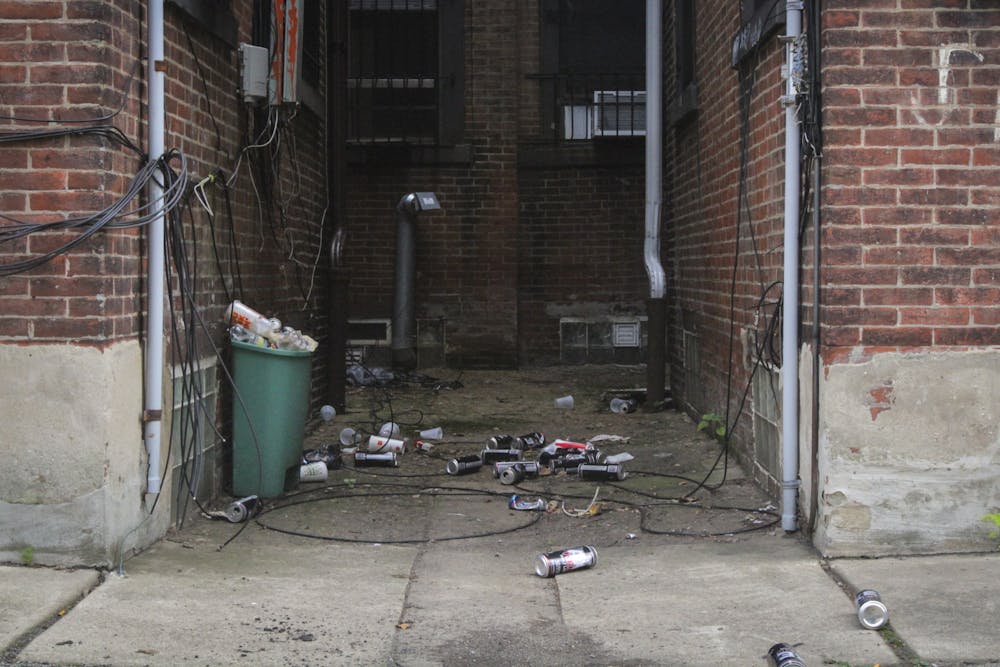
Trash is seen outside of fraternity houses in the West Philadelphia neighborhood on Oct. 4.
Credit: Matthew SchwartzGrowing frustrated with recent littering and garbage on the sidewalks outside fraternity houses on Spruce Street, some Philadelphia residents want more respect from Penn students.
Christina DeFelice, a resident of Philadelphia, found piles of trash outside of fraternity houses in mid-September while walking back home in the morning after her shift at the Children’s Hospital of Philadelphia. DeFelice and other Philly residents related this to a lack of respect towards native residents.
“Trash is so excessive it spills over their porches, down their steps to their front lawns, into the sidewalks and streets,” DeFelice wrote to the DP.
After talking to her husband, who was part of Greek life during college, DeFelice said she began to feel more empathetic towards the students, whom she believes were likely just excited to be back on campus. Still, DeFelice said Penn students and the University's Greek life need to be more respectful of the West Philadelphia community and its residents.
The Office of Fraternity and Sorority Life did not respond to a request for comment.
College junior and social chair of Delta Kappa Epsilon Jacques Thompson said his fraternity’s chapter house, located at 307 S. 39th Street, just off Spruce Street, has not received any complaints this year about littering or garbage in public areas. But Thompson said he has noticed trash piled up on the sidewalk during some weekends this semester, and attributed the increase in garbage to the return of in-person campus life, including parties at fraternity houses.
“I want to make sure that the residents that we’re being good neighbors to are not uncomfortable with our existence,” Thompson said. “It's an issue, but not one that can't be solved.”
Penn Facilities and Real Estate Services Operations Manager Dennis Flannery wrote in an email to the DP that while FRES oversees disposal for on-campus Greek houses, off-campus Greek life houses have their trash disposed of by private waste haulers through a contract with Campus Apartments — not the University.
Flannery added that a mechanical breakdown of the contracted company's trucks caused a delay of a few days in trash pickup two weeks ago at 3926 and 3928 Spruce Street, the locations of the chapter houses for Chi Omega and Sigma Kappa, which are both sororities.
Chase Howell, a former Penn student and current West Philadelphia resident living in Walnut Hill, found out about the littering DeFelice had seen through a post DeFelice shared in the West Philadelphia Neighborhood Facebook group describing the scene.
Like DeFelice, Howell said Penn students should be more considerate about leaving their garbage out in the neighborhood. Howell said this would be difficult, however, since she believes the University inherently teaches its students, who are then encouraged by their peers, to not interact with the Philadelphia community because it may be dangerous.
“[Penn students] are never told to be respectful or kind — only disdainful and afraid,” Howell wrote in an email to the DP on Sept. 24, recalling being told by other upperclassmen students to not go past 40th Street.
“I think that Penn students becoming more involved in the West Philadelphia community will help them realize that these are people that they live with, and sort of help to form a bond and restore some of the trust that has been lost between West Philadelphia and Penn and its students in general,” Howell said, adding that this may lead to a decrease in littering near campus.
Students have previously raised issues with Penn's relationship with Philadelphia, including during a discussion in 2016 held by the United Minority Council on how Penn resources can be best used to address West Philadelphia's needs. Students, faculty, and staff have also recently called on the University to pay Payments in Lieu of Taxes, or PILOTs, to the city.
The residents also suggested Penn can improve its relationship with the city by making parts of campus more accessible to the public, and by encouraging students to engage in community events like Books Through Bars, which sends free books to people who are incarcerated in Pennsylvania's prisons.
While Philadelphia resident and local radio host Tamera Russell, who goes by P.O.C., Proof of Consciousness, said she understands how students want to be cautious while living in a city environment, she believes they need to be more respectful and welcoming towards the community as they are ultimately visitors.
“It is like living in a grey area where the regular Philadelphia community or people who do not belong to Penn honestly do not exist in a four-block radius outside of [housing] projects that Penn has,” P.O.C. said, referring to Penn students.
The University can improve its segregated relationship with Philadelphia by making its campus more community-friendly, by allowing local residents to use their restrooms, and making it more acceptable for residents to sit on benches on campus, for example, P.O.C. said.
“Yellow shirts are everywhere,” P.O.C said, referring to Penn Police members who wear bright yellow shirts while on duty around campus. “It’s like walking on eggshells in our own community. Going from maybe 40th Street and Spruce Street to 36th and Market, in that area alone it's like, ‘Yo why can’t we sit on this bench? Why can’t we sit in this park?”
The Daily Pennsylvanian is an independent, student-run newspaper. Please consider making a donation to support the coverage that shapes the University. Your generosity ensures a future of strong journalism at Penn.
Donate



